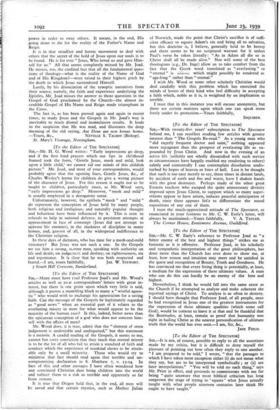THE GOSPELS RE - READ [To the Editor of THE SPECTATOR] SIR, — Mr.
Joad goes to work on the Gospels quite wrong- headedly. He should know by this time that no whole or true impression of Jesus Christ can be received by a " mind deliberately eviscerated of historical associations and stripped of theological prepossessions." Like many otherwise intelli- gent men, he seems to look upon the Gospel narratives as though they were so much inscribed meteorite, and to study Jesus as though He appeared in a vacuum.
The very title Christ makes Jesus inseparable from history and theology. He can never be dissociated from His initial announcement: "The time is fulfilled, and the kingdom of God is at hand." The announcement implied that the faith and hope of Israel were in fulfilment, and that God was about to act.
The Synoptic narrative is essentially the story of the experi- ence of the eager young Jews who followed Jesus on hearing that announcement. It is the story of what happened to thcm. It is the account of how they were led forward to the culmi- nating hour of the Passion at Jerusalem. No one can make anything of the exact chronology of this movement, but the main phases in it are evident (most evident in St. Mark).
It is plain that there was a first phase—summed up by Jesus in the Parable of the Sower—of broadcasting the announce- ment of the imminence of the kingdom. In the second phase Jesus concentrated on imparting to His friends (so far as they could receive it) the mystery of the kingdom, which was no other than they, as ardent Jews, expected. This phase reached a climax at the moment near Cesarca Philippi, when Peter expressed the belief that not only was the kingdom near, but that Jesus was the King—God's Christ. That moment is the turning-point in the whole story. It was followed by the third phase, which was that of the relentless movement forward by Jesus to Jerusalem, that the hour of God and of His kingdom which was to strike there.
Cut out all this foundation-element of dramatic and tragic movement to the culminating hour at Jerusalem, and inevitably the Synoptic Gospels fall into " strings of detached sayings and incidents " which strike Mr. Joad as " naïvely episodic."
For the same reason he misses the main thing which binds our hearts and minds to Jesus, despite this or that which is puzzling in His teaching. Jesus was here not just to talk at men, but to act on their behalf. From first to last He put the whole of Himself into obedience to the Father's will. It meant resisting the intensest temptation as to how He should use power in order to sway others. It meant, in the end, His going alone to die for the reality of the Father's Name and Reign.
It is in that steadfast and heroic movement to deal with others that the secret of the hold of Jesus upon our souls is to be found. He is for ever " Jesus, Who loved us and gave Him- self for us." All that seems completely missed by Mr. Joad. He misses, too, the cardinal fact that all the fundamental ques- tions of theology—what is the reality of the Name of God and of His Kingdom?—were raised to their highest pitch by the death to which Jesus surrendered Himself.
Lastly, by his dissociation of the synoptic narratives from their source, namely, the faith and experience underlying the Epistles, Mr. Joad misses the answer to those questions in the Gospel of God proclaimed by the Church—the almost in- credible Gospel of His Name and Reign made triumphant in the Cross.
The fact is, as has been proved again and again in recent times, to study Jesus and the Gospels in Mr. Joad's way is inevitably to reach dismal and inconclusive results. It leads to the suspicion that He was mad, and illustrates the deep meaning of the old saying, Aut Deus aut non bonus homo.











































 Previous page
Previous page